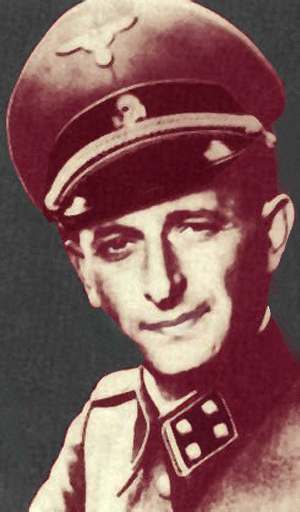Post by cruororism on Oct 12, 2003 10:13:13 GMT

(1906-1962)
SS Lieutenant-Colonel who was Chief of the Jewish Office of the Gestapo during World War II and implemented the 'Final Solution' which aimed at the total extermination of European Jewry, Adolf Eichmann was born in Solingen on 19 March 1906.
The declasse son of a solid middle-class Protestant family which had moved to Linz, Austria, where Eichmann spent his youth, he failed to complete his engineering studies. After working briefly as an ordinary labourer in his father's small mining enterprise and then in the sales department of an Upper Austrian electrical construction company, Eichmann became a travelling salesman for the Vacuum Oil Company between 1927 and 1933.
On April 1, 1932 he joined the Austrian Nazi Party at the suggestion of his compatriot Ernst Kaltenbrunner. Having lost his job he sought employment across the border in Bavaria in July 1933, joining the exiled Austrian legion and undergoing fourteen months' military training.
In September 1934 he found an opening in Himmler's Security Service (SD) which provided him with an outlet for his bureaucratic talents. By the beginning of 1935 he was the official responsible for 'Jewish questions' at the Berlin head office of the SD, specializing in the Zionist movement. He acquired a smattering of Hebrew and Yiddish, and briefly visited Palestine in 1937 to explore the possibilities of Jewish emigration from Nazi Germany to Palestine.
Appointed assistant to the SD leader of the SS main region, Danube, Eichmann's first big opportunity came after he was sent to Vienna by the Gestapo to prepare the ground for the Anschluss.
From August 1938 he was in charge of the "Office for Jewish Emigration" in Vienna set up by the SS as the sole Nazi agency authorized to issue exit permits for Jews from Austria, then Czechoslovakia and later the old German Reich. Eichmann's acquired expertise in "forced emigration"--in less than eighteen months approximately 150,000 Jews left Austria--and extortion was to prove an ideal training-ground for his later efficiency in "forced evacuation," i.e., the registering, assembly and deportation of Jews to extermination centres in the East. By March 1939 he was already handling forced deportations to Poland and, in October of the same year, he was appointed special adviser on the "evacuation" of Jews and Poles.
In December 1939 Eichmann was transferred to Amt IV (Gestapo) of the Reich Main Security Office (RSHA) where he took over Referat IV B4 dealing with Jewish affairs and evacuation. For the next six years Eichmann's office was the headquarters for the implementation of the 'Final Solution'; though it was not until the summer of 1941 that his 'resettlement' department began the task of creating death camps, developing gassing techniques and organizing the system of convoys that were to take European Jewry to their deaths.
It was in 1941 that Eichmann first visited Auschwitz and in November of the same year he was promoted to SS Lieutenant-Colonel. He had already begun to organize the mass deportation of Jews from Germany and Bohemia, in accordance with Hitler's order to make the Reich free of Jews as rapidly as possible.
The Wannsee Conference of January 20, 1942 consolidated Eichmann's position as the "Jewish specialist" of the RSHA and Heydrich now formally entrusted him with implementing the "Final Solution." In this task Eichmann proved to be a model of bureaucratic industriousness and icy determination even though he had never been a fanatical anti-semite and always claimed that "personally" he had nothing against Jews. His zeal expressed itself in his constant complaints about obstacles in the fulfilment of death-camp quotas, his impatience with the existence of loopholes such as the free zone in Vichy France or the unco- operativeness of the Italians and other German allies in expediting their Jews.
When even Himmler became more "moderate" towards the end of the war, Eichmann ignored his 'no gassing' order, as long as he was covered by immediate superiors like Heinrich Muller and his old friend, Kaltenbrunner. Only in Budapest after March 1944 did the desk-murderer become a public personality, working in the open and playing a leading role in the massacre of Hungarian Jewry. In August 1944 the 'Grand Inquisitor' of European Jewry could report to Himmler that approximately four million Jews had died in the death camps and that another two million had been killed by mobile extermination units. Though arrested at the end of the war, Eichmann's name was not yet widely known and he was able to escape from an American internment camp in 1946 and flee to Argentina. He was eventually tracked down by Israeli secret agents on May 2, 1960, living under an assumed name in a suburb of Buenos Aires. Nine days later he was secretly abducted to Israel, to be publicly tried in Jerusalem. The trial, which aroused enormous international interest and some controversy, took place between April 2 and August 14, 1961. On December 2, 1961 Eichmann was sentenced to death for crimes against the Jewish people and crimes against humanity. On May 31, 1962 he was executed in Ramleh prison.


